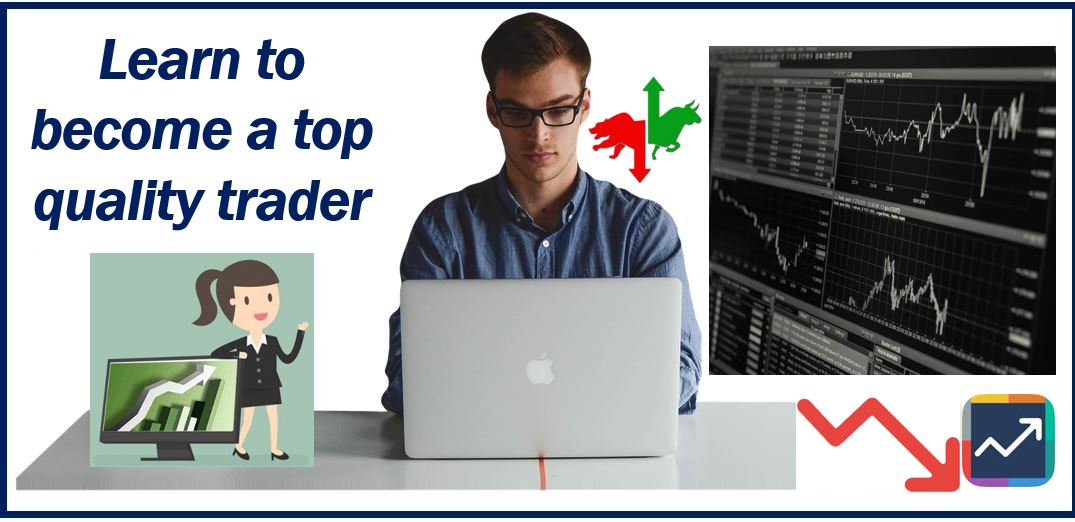We have all heard the horror stories of beginner traders losing money on the markets. It is often because they jumped in without being adequately prepared. It is such stories that stop others from becoming traders. There are several things that most successful traders will tell you that they wish they had known as beginners.

To help those that are looking to start online trading, here are 5 steps to start trading for beginners. Online trading the arbitrate of various instruments of value. You can purchase them when you consider them to be undervalued, and sell them when they reach their true value. Traders can also anticipate a negative direction of financial instruments. That is known as shorting.
1. Educate Yourself
As the saying goes “a little knowledge” is usually more dangerous than no knowledge at all. Such is the plight of many trading beginners. They start with little knowledge and unreasonable expectations. The first port of call for any trader should always be knowledge. It puts you in a position to understand the market and how to react to different scenarios.
Do not be too keen to get going before you know what you are doing. At the very least, have a solid strategy developed before going into the market. One can have a strategy in which they only trade under very specific conditions that they are now comfortable with.
The temptation is always to extend yourself further. This is especially true for those that see some early success. It takes a great deal of discipline to stick to the plan.
2. Consider your finances
It costs money to get started. There are two ways to view your finances. The first one would be to consider how your strategy sits in relation to the capital that you have at your disposal. Another aspect comes even earlier. You must consider the words that most brokers are forced to place on their platforms. They warn you that your capital is at risk.
Although trading invariably marries risk, it is important to ensure that this risk is managed well. It is fairly common for beginners to lose all of the money that they start with. This can be quite a sobering experience. Consider your finances from the lenses of the distinct possibility that you may lose it all.
As daunting as that may seem, it keeps you grounded in your strategy. That is how you protect your finances long term. If this is built into your very being as a beginner, it will surely serve you well as your capital grows.
3. Find a good online broker

Beginners have a lot of things to consider when they are getting started trading. Even if the strategy was perfected, the wrong broker can have a detrimental effect. There are several things that every beginner should look for in a good online broker. A good trading platform for beginners is one that makes it easy to get started. This can be done by allowing you access to the platform through a demo account. This helps build up your confidence as you see how you would use this platform to implement your strategy.
A great strategy to find the best trading trading platform that meets your needs is to look online. For example, if trading in Australia, it would be advisable to pick a ASIC regulated broker. Websites like PublicFinanceInternational.org analyze trading platforms based on different needs.
Most beginners are apprehensive about making their initial deposit. Understandably so. A good online broker is one that ensures that all of these concerns are addressed. They should be a platform that is regulated by an independent authority. Better yet, one that is regulated in both the US and in the EU and other top-tier regulators.
Ease of use is important when considering the platform. There are two points of view from which to consider it. The broker can provide you with great support and extensive educational material on how to use their platform to do all sorts of things. They can also make the platform incredibly straightforward in terms of the user interface. It should be easy to find the options that you need.
There is likely to be a learning curve with whatever online broker’s platform you choose. This curve does not always have to be a steep one.
4. Practice
We have already mentioned the importance of preparation for all traders. This is where the trading demo account comes into play. Before you can start investing your capital on live trades, it is worth taking a shot at using a demo account. Using the real-life data to see how well you do over a couple of weeks would help.
You will start to understand the fact that all traders will have winning and losing trades. What differentiates them is that the better traders have more wins than losses. They tend to win big and lose small. A demo account also affords you a large trading capital. This reduces the usual limitations that most beginners have. With more capital in the demo account, you can trade on all sorts of stocks and shares.
This is a great way to not only hone your skills, but to also become comfortable trading on any platform. Watching your demo account’s capital grow will inspire you to take the plunge. The prevailing wisdom is to do as many trades as possible in varying scenarios before moving away from the demo trading account. Learn as much as you can before each lesson comes at the cost of your capital.
5. Open a real account
Now that you have had some practice and are ready to take on the market, it is time to open a real account. Most online brokers make the transition from a demo account to a live one very easy. You may not have had to confirm your identity or add your banking details when creating the demo account. At this point, you will be required to do so.
It usually takes a few minutes to complete this. ID verification is often automated. However, there are cases where the provided document would need to be manually verified. In which cases, there may be a waiting period involved.
Once your identity is verified, you have the option to add your banking details and make your first deposit. Most platforms have a minimum deposit that they will accept. For most beginners, it is advisable to start small and increase the capital as you grow in confidence.
Conclusion
While there are several ways to get started as a beginner, the ones listed above are the core principles. They will help you prepare for trading and get started. There are safety precautions throughout the process. These ensure that you are afforded the time to set yourself up before placing your hard-earned money at risk.
Video – What is a Trader?
Interesting related article: “What is a Trader?”

